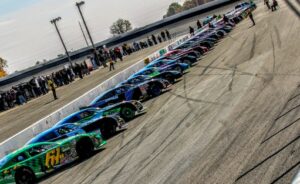Navigating the Fast Lane: Racing Regulations at Winchester Speedway
Winchester Speedway, a historic and beloved racing venue, has been a stage for thrilling motorsport action for over a century. The high-banked half-mile oval track in Winchester, Indiana, has played host to numerous racing events, showcasing both local talent and national stars. To ensure fair play, safety, and an exciting experience for both drivers and spectators, a comprehensive set of racing regulations is enforced. In this in-depth article, we’ll explore the racing regulations at Winchester Speedway, highlighting the rules and safety measures that make this track a beacon of short-track racing excellence.

1. Safety First: Equipment Regulations
Safety is paramount in motorsport, and Winchester Speedway is no exception. The track enforces stringent equipment regulations to protect drivers in the event of accidents or collisions. Here are some key safety requirements:
- Helmets: Drivers must wear certified helmets that meet specific safety standards.
- Fire Suits: Fire-resistant suits are mandatory for all drivers to reduce the risk of injury in the case of fires.
- Roll Cages: Race cars must be equipped with roll cages that provide structural integrity during accidents.
- Seat Belts and Harnesses: Properly installed seat belts and harnesses are crucial to keeping drivers securely in their seats.
- Window Nets: Window nets are used to prevent drivers’ limbs from extending outside the vehicle in case of a rollover.
- Fire Suppression Systems: Cars are equipped with fire suppression systems to quickly extinguish any fires that may occur during a race.
- Fuel Cell Containment: Fuel cells are enclosed to prevent fuel spillage in case of impact.
2. Vehicle Specifications
To ensure fair competition, racing regulations dictate vehicle specifications. These regulations often vary depending on the type of race and class of vehicles. Key considerations include engine size, weight, and suspension.
3. Fuel and Fluids
The types of fuels and fluids used in race cars are often strictly regulated to maintain a level playing field and ensure safety. For instance, some classes may be required to use specific types of racing fuel to prevent cheating and ensure consistent performance.
4. Vehicle Inspection
Before races, vehicles undergo thorough inspections to ensure compliance with the regulations. This includes scrutinizing safety equipment, vehicle specifications, and other key components.
5. Racing Classes
Winchester Speedway hosts a variety of racing classes, each with its own set of regulations. These classes range from late models to modifieds and more. The regulations for each class cater to the specific characteristics and performance capabilities of the vehicles in that class.
6. Driver Conduct and Sportsmanship
In addition to technical regulations, Winchester Speedway enforces strict rules regarding driver conduct and sportsmanship. Drivers need to adhere to a code of ethics that includes:
- Respect for Fellow Competitors: Drivers typically have to treat their fellow competitors with respect both on and off the track.
- Sportsmanship: Unsportsmanlike conduct, such as aggressive driving or retaliation, will not fly.
- Obedience to Officials: Drivers must follow the instructions and decisions of race officials.
- Track Etiquette: Observing track etiquette and yielding to faster cars is essential for maintaining order on the track.
7. Race Control and Officiating
Winchester Speedway employs a team of race officials and stewards who oversee events and ensure that regulations stand stout. These officials are responsible for making critical decisions during races, such as assessing penalties for rule violations and making judgment calls on on-track incidents.
8. Race Procedures
Race procedures and formats are also subject to regulations. Rules for starts, restarts, and pacing laps are in place to ensure safe and fair racing. These rules may include double-file or single-file restarts, cone restarts, and more, depending on the event.
9. Technical Inspections
After races, technical inspections run through, i n order to verify that the competing vehicles were in compliance with the regulations throughout the event. Vehicles that fail inspections may face penalties or disqualification.
10. Penalties and Disqualifications
In the event of rule violations or unsportsmanlike conduct, penalties may require checking. These penalties can range from loss of positions in the race to suspensions, fines, or disqualification from the event.
11. Fan Safety and Conduct
Spectators play an important role in the overall racing experience, and Winchester Speedway has regulations in place to ensure their safety and enjoyment. These may include guidelines for seating, parking, and behavior within the spectator areas.
12. Environmental Responsibility
Winchester Speedway also places emphasis on environmental responsibility. Regulations may be in place regarding the disposal of hazardous materials and waste, and measures to minimize the environmental impact of racing activities.
13. COVID-19 Safety Measures
In response to the global pandemic, Winchester Speedway, like many other racing venues, has implemented specific safety measures to protect participants and spectators. These measures may include social distancing, mask mandates, and health screenings.
Conclusion: Upholding the Tradition of Excellence
The racing regulations at Winchester Speedway are not just rules; they are the bedrock of an institution with a legacy of excellence. These regulations aim to ensure the safety of all participants, maintain fair competition, and uphold the integrity of the sport. As Winchester Speedway continues to host thrilling races and produce champions, it does so with a steadfast commitment to the principles that have made it a beloved destination for motorsport enthusiasts for over a century.
